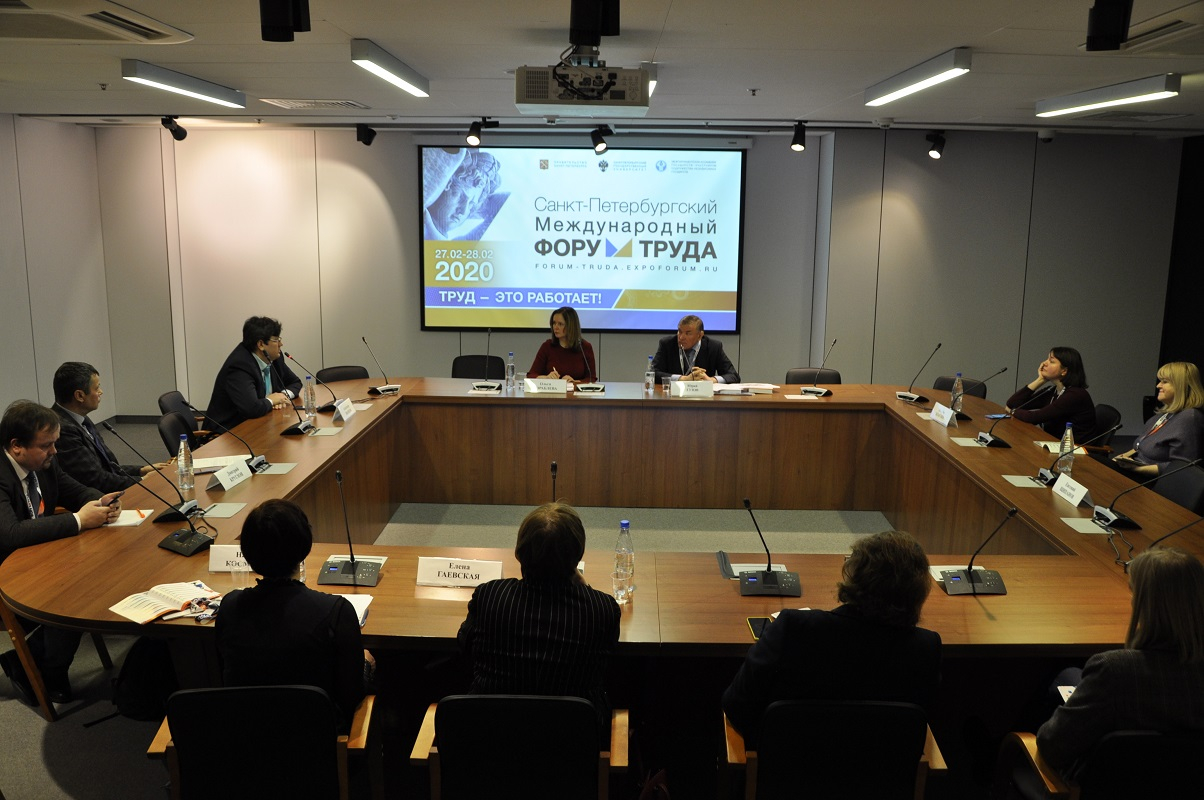‘Militant dilettantes’, new professions and online courses: how the competency model is changing in the new digital environment

A roundtable discussion ‘Digital learning environment and developing a base competency model’ has been held as part of the 4th International Labour Forum in St Petersburg. Representatives of the academic community have discussed the challenges and ways of digitalisation of higher education.
The event was moderated by Olga Korableva, a professor at St Petersburg University. She raised the topic of the transformation of the base competency model and associated challenges. Professor Korableva proposed to discuss the following questions. Shall the key competency framework be defined by socio-economic processes, or will the young specialists be forming new realities themselves? Is it a plausible scenario that in a turbulent, ever-changing environment the education system will select and define the core values?
The University has wide experience in the digitalisation of the education process, and we are willing to share this experience with our colleagues.
Associate Professor Iurii Guzov, First Deputy Dean of the Faculty of Economics at St Petersburg University
Associate Professor Iurii Guzov is First Deputy Dean of the Faculty of Economics at St Petersburg University. He expressed his opinion that science and education need to adapt to the demands of the modern world – they have to take an active part in solving challenges associated with global digitalisation. These challenges, according to Iurii Guzov, include: unemployment caused by robotisation; cybercrime; and ‘digital cocooning’, when a person becomes withdrawn from physical interaction in the real world focusing on virtual communication instead. Furthermore, we can see ‘militant dilettantism’ gaining momentum. This is a situation when traditional authorities and opinion leaders are losing their influence. Meanwhile knowledge – due to easy accessibility – will be regarded as commonplace.
In the digital economy, old professions are being replaced by new ones. Iurii Guzov stressed that emerging career zones present new job opportunities. For instance, emerging career zones in finance include: the assurance advocate; the business transformer; the data navigator; the digital playmaker; and the sustainability trailblazer. These new trends should be taken into consideration when developing the key competency model.
Natalia Vlasova, Head of the Teaching Methods Department of the Centre of E-learning Development at St Petersburg University and Assistant Professor at the Department of Chinese Philology, delivered a talk about developing online learning resources. According to Natalia Vlasova, contrary to popular opinion, the average age of an online student is 28. This indicates that distance learning is interesting not only for young people. In fact, the online student population includes older adults (aged 65 and older).
> 1,000,000
students have taken online courses designed by the Centre of E-learning Development at St Petersburg University over the last three years
Natalia Vlasova noted that the University seeks to create an adaptable and personalised learning environment. In many career zones, professionals need to upgrade their knowledge and skills every few years. An online education enables them to plan their professional development and offers viable lifelong learning opportunities. In addition to some specific hard skills, many online courses focus on development of digital competencies and soft skills. Over 600 St Petersburg University academics and invited lecturers have already taken part in creating online courses. Importantly, the very process of designing an e-learning course helps the authors to enhance their teaching skills in a way that few other professional development programmes offer, Natalia Vlasova emphasised.
St Petersburg University was the first in Russia to sign an agreement with the Chinese online platform XuetangX and develop a collaborative product for it. Also, we have a variety of courses taught in English on Coursera.
Natalia Vlasova, Head of the Teaching Methods Department of the Centre of E-learning Development at St Petersburg University
Elena Gaevskaya is Associate Professor at the Department of Information Systems in Arts and Humanities at St Petersburg University. She shared her experience of developing digital competencies among students in the creative arts programmes. Additionally, she touched upon the topic of virtual museums projects designed by students in collaboration with the State Russian Museum.
The keynote speakers in the roundtable discussion included: Aleksandr Zvontsov, Head of the Department for the Development of Digital Learning Environment at Saint Petersburg Electrotechnical University ‘LETI’; Nadezhda Kosmacheva, Dean of the Faculty of Economics at Pushkin Leningrad State University; and Dmitrii Kruglov, Professor of Saint Petersburg State University of Economics. They talked about digitalisation of higher education drawing on the examples of their universities. They also discussed: digital university models; development of digital competencies in postgraduate educational programmes; and human resources management in education.

